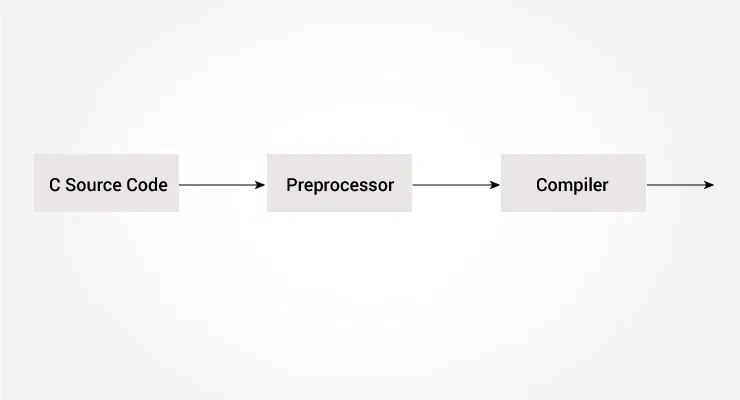
The C preprocessor is a macro preprocessor (allows you to define macros) that transforms your program before it is compiled. These transformations can be the inclusion of header files, macro expansions, etc.
All preprocessing directives begin with a # symbol. For example,
#define PI 3.14
Some of the common uses of C preprocessors are:
Including Header Files: #include
The #include preprocessor is used to include header files to C programs. For example,
#include <stdio.h>
Here, stdio.h is a header file. The #include preprocessor directive replaces the above line with the contents of stdio.h header file.
That's the reason why you need to use #include <stdio.h> before you can use functions like scanf() and printf().
You can also create your own header file containing function declaration and include it in your program using this preprocessor directive.
#include "my_header.h"
Visit this page to learn more about using header files.
Macros using #define
A macro is a fragment of code that is given a name. You can define a macro in C using the #define preprocessor directive.
Here's an example.
#define c 299792458 // speed of light
Here, when we use c in our program, it is replaced with 299792458.
Example 1: #define preprocessor
#include <stdio.h>
#define PI 3.1415
int main()
{
float radius, area;
printf("Enter the radius: ");
scanf("%f", &radius);
// Notice, the use of PI
area = PI*radius*radius;
printf("Area=%.2f",area);
return 0;
}
Function like Macros
You can also define macros that work in a similar way as a function call. This is known as function-like macros. For example,
#define circleArea(r) (3.1415*(r)*(r))
Every time the program encounters circleArea(argument), it is replaced by (3.1415*(argument)*(argument)).
Suppose, we passed 5 as an argument then, it expands as below:
circleArea(5) expands to (3.1415*5*5)
Example 2: Using #define preprocessor
#include <stdio.h>
#define PI 3.1415
#define circleArea(r) (PI*r*r)
int main() {
float radius, area;
printf("Enter the radius: ");
scanf("%f", &radius);
area = circleArea(radius);
printf("Area = %.2f", area);
return 0;
}
Visit this page to learn more about macros and #define preprocessor.
Conditional Compilation
In C programming, you can instruct the preprocessor whether to include a block of code or not. To do so, conditional directives can be used.
It's similar to a if statement with one major difference.
The if statement is tested during the execution time to check whether a block of code should be executed or not whereas, the conditionals are used to include (or skip) a block of code in your program before execution.
Uses of Conditional
- use different code depending on the machine, operating system
- compile the same source file in two different programs
- to exclude certain code from the program but to keep it as a reference for future purposes
How to use conditional?
To use conditional, #ifdef, #if, #defined, #else and #elif directives are used.
#ifdef Directive
#ifdef MACRO
// conditional codes
#endif
Here, the conditional codes are included in the program only if MACRO is defined.
#if, #elif and #else Directive
#if expression
// conditional codes
#endif
Here, expression is an expression of integer type (can be integers, characters, arithmetic expression, macros, and so on).
The conditional codes are included in the program only if the expression is evaluated to a non-zero value.
The optional #else directive can be used with #if directive.
#if expression
conditional codes if expression is non-zero
#else
conditional if expression is 0
#endif
You can also add nested conditional to your #if...#else using #elif
#if expression
// conditional codes if expression is non-zero
#elif expression1
// conditional codes if expression is non-zero
#elif expression2
// conditional codes if expression is non-zero
#else
// conditional if all expressions are 0
#endif
#defined
The special operator #defined is used to test whether a certain macro is defined or not. It's often used with #if directive.
#if defined BUFFER_SIZE && BUFFER_SIZE >= 2048
// codes
Predefined Macros
Here are some predefined macros in C programming.
| Macro | Value |
|---|---|
__DATE__ |
A string containing the current date. |
__FILE__ |
A string containing the file name. |
__LINE__ |
An integer representing the current line number. |
__STDC__ |
If follows ANSI standard C, then the value is a nonzero integer. |
__TIME__ |
A string containing the current time. |
Example 3: Get current time using __TIME__
The following program outputs the current time using __TIME__ macro.
#include <stdio.h>
int main()
{
printf("Current time: %s",__TIME__);
}
Output
Current time: 19:54:39